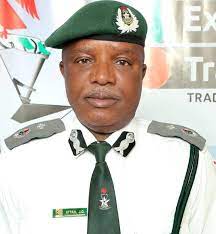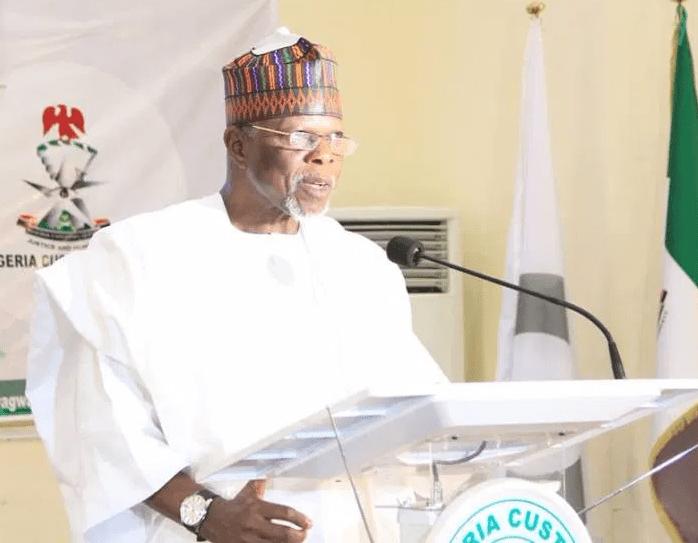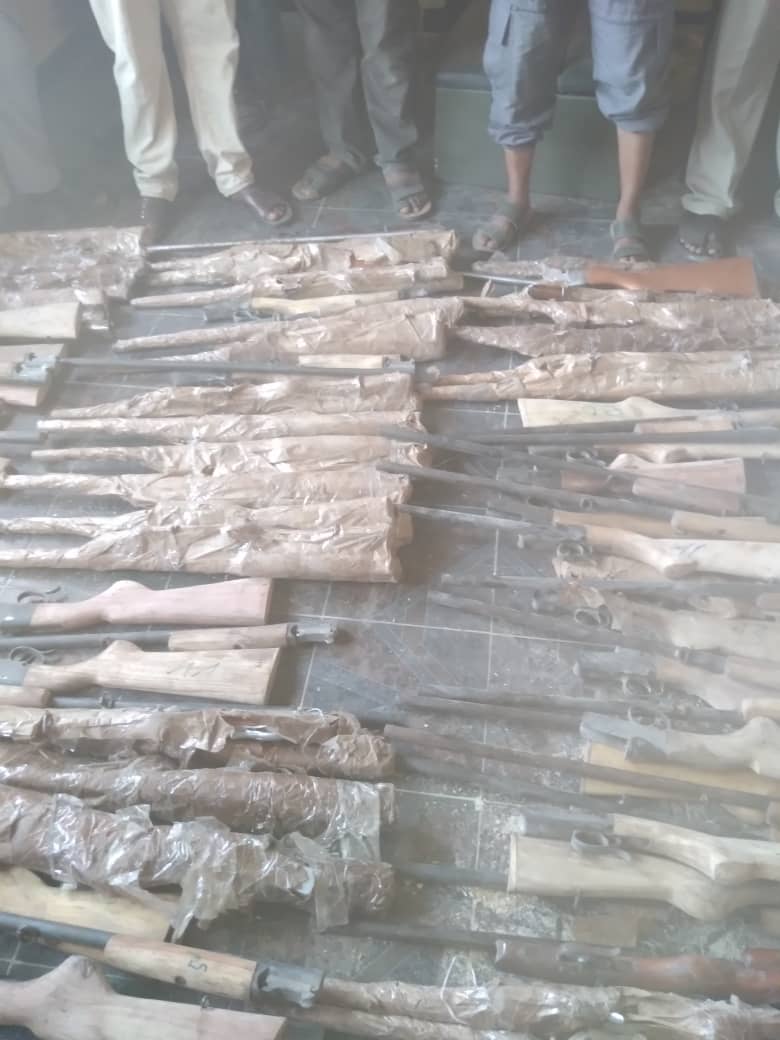Maritime
Official Sabotage : Failed Nigeria Cargo Scanners (1)
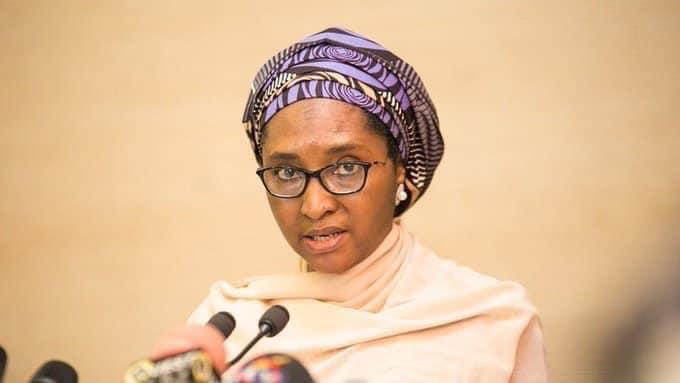
BY EGUONO ODJEGBA & FUNMI ALUKO
Intrigues, power play and self serving interests that led to the failed 2018 N9billion three Raspian Cargo Scanners purchase deal by the federal government, highlights the damning verdict of official sabotage which characterized the collapse of the ports cargo scanning system.
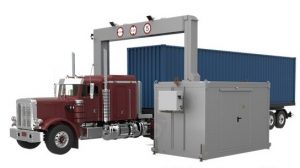
Prototype scanning system
Nor is the said sabotage to be understood simply in terms of financial misappropriation, but also in terms of strings of convoluted vices including official rigmarole, nonchalance and conceit; and state actors’ big hotheadedness.
Strangely, none of the actors involved in the cargo scanner sabotage is a foreigner; they are all Nigerians, and almost all of them in commanding positions of appointments, cocooned in self serving attitude in relevant ministries, departments and agencies (MDAs) of government.
The journey started in 2005, when the Nigerian Ports Authority adopted cargo scanning clearing system under its Destination Inspection regime, alongside her first major ports reform, in which three companies adjudged as expert firms, namely, Cotecna Destination Inspection Limited (CDIL), SGS, and Global Scan systems were signed on as scanners service providers.
It will be recalled that the appointments of the service providers followed a stormy and controversial bid process. The terms of contract which commenced in January 2006, carried a straight forward agreement in which the service providers were to supply cargo scanning machines on build, own, operate and transfer (BOOT) basis.
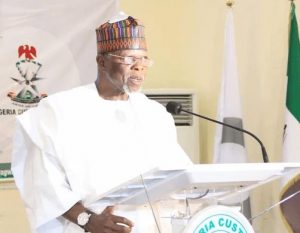
Ali, Customs boss
The BOOT imposed on the service providers the obligation to train officers and men of the Nigerian Customs Service (NCS) on import risk management, valuation and classification, including transfer of technical skills to enable the Nigeria Customs take over the DI operation from the service providers at the end of a seven-year contract period.
At the expiration of the contract in 2013, the NCS took over the DI regime, and thus inherited all 22 scanners at the various designated seaports and land borders, nationwide. Sadly, all 22 scanners suffered varying degrees of malfunctions barely a year after, until, one after the other, they all packed up; and the Customs reverted to manual inspection of cargo.
Whereas it was believed that the then Customs Comptroller General, Dr. Abdullahi Dikko, took steps to make the scanners work at a sub-optimal level, his successor, retired Col. Hameed Ali, for his own reasons, failed to concern himself with the machines nor cargo scanning.
Expectedly, the scanning system crashed under his watch, despite that he was appointed to reform, restructure and reposition the customs service. Those whose business it is to know say Ali was not interested in working with the scanners and alluded to his body language and actions, which they purport, appeared wired in favour of 100 percent physical examination of cargo.
Freight believe that the scanners were allowed to collapse intentionally, as a deliberate ploy aimed at achieving higher revenue yield through manual process that reportedly allows for official arm twist and underhand deal.
Amid the 100% physical examination of cargo at the entry points, Customs is still grappling with the challenges of primitive style anti-smuggling operations, in township and open markets, despite having resulted regular clashes leading to loss of lives of civilians and officers, alike, courtesy of its antiquated laws.
Observers are concerned about certain degree of apathy to these operational clashes and deaths, including avoidable injuries and death of customs men. The sordid reality of a service that engages in the most grotesque operational approach to secure five bags of suspected smuggled rice in lieu of human life, be it civilian or operatives remains a badge of dishonour of such a system, government and nation, where a bag of rice is worth more than a human life, including officers’ lives.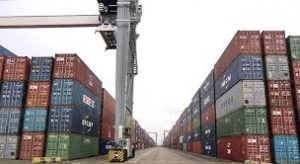
The 2018 failed cargo scanners purchase also left the customs leadership with integrity question marks, for its inability to timely process the deal, believed to have scaled through the Bureau for Public Procurement (BPP) which in turn issued the purchase approval, tied to the prevailing tax regime and exchange rate.
The controversy widened as the supervisory ministry of finance, involved in the transaction as the originating authority, was also believed to have been engaged in a number of official rigmarole regarding the deal.
Despite huge public outcry alleging sabotage and suggesting that the 22 inherited scanners are still within their manufacture lifespan and are serviceable, Zainab Ahmed, the finance minister simply refused to react. Rather than look into stakeholders critical submissions on how best to turn around the moribund scanners, her whole interest bubbled with the purchase of new ones.
She never recommended or probed the serviceability of the moribund scanners, but like her predecessor, Kemi Adeosun, got involved in the controversial failed scanner purchases, that appears to have been ringing loud bells of possible racketeering.

Immediate past ANLCA President, Shittu
While the scale of suspicion of internal sabotage stretches endlessly, the failure of NCS to pull through with pile up of approvals granted it, is helping to oil the speculation that either the customs prefer that import inspection regime remain tied to manual physical examination with its widespread sharp practices, or that the customs leadership for whatever reasons, appear uninterested, which fundamentally raises questions about his understanding of his official mandate; beyond the limited prism of revenue farming through repressive toll engineering.
It is hard not to believe that the seeming unholy romance between the ministry of finance, customs service, BPP and the various contractors over the unending tales of scanners purchase has some underlying motives.
So far, Customs boss Ali has remains unapologetic about his hippie-on-the-highway customs enforcement style, even as he delights in associating such primitive pastime to war against corruption. Corruption which potential radius terminates with ordinary people and occasionally political opponents, and in which government officials, not the least, the presidency and the entire cabinet, and the parliament alone, is above board.
The latest fad has been about corruption fighting back, to which our government officials make it look like corruption is the business of the masses and political opponents. It presupposes a scenario which makes the struggling masses the culprits, and those in government, victims.
But that is not only a lie but propaganda and wicked insinuation intended to obfuscate the truth. In Nigeria, officials who talk so much about corruption and expresses seemingly loud and sanctimonious anger are often the hidden masquerades behind unspeakable and shameful acts of corruption.
To sustain their warped reasoning, those in position of authority often deploys every official arsenal at their disposal to create hardships through unreasonable and oppressive policies, with pretension to reinventing the local economy and productivity, in which they wish to be seen as champion of moral, social, political and economic regeneration.
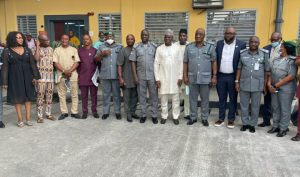
Mustapha, in native caftan and cap, middle, Edore, 5th right, Mohammed, 3rd right, Ebeatu, 2nd right, Garba, next to Mustpha, and others

But much more than that, to be able to find reasons to continually criminalize the system and be able to recline in the arm chair of moral political economy, and thus also be able to sustain their evil grip on the suffering masses through these voodoo policies and retrogressive fiscal frameworks.
History has taught us they are no more than lying lips and pernicious demagogues, who have taking official deceit and fine character photo shopping to high pedestal. For example, following the raging issue of scanners, some of the service providers who handed over the controversial scanners to Nigeria Customs Service in 2013 have accused this government of insincerity.
Fred Udechukwu, the Managing Director of Global Scan Systems Limited, one of the service providers, accused the NCS of deliberately sabotaging scanning operations, through negligence and improper handling of the scanners, which he claimed were handed over under satisfactory working conditions.
Udechuckwu who made a presentation at a one day public hearing by the House Committee on Customs and Excise Public Hearing on Scanners on 24th May 2021, decried the ways and manners the 22 cargo scanners, purportedly worth $120 million were left to rot away by the present customs administration.
He also accused Customs of rejecting offer by his company to help maintain the scanners when it was obvious the Service could no longer do so.
He said, “All of us handed over the scanners to Customs in November 2013 certified by Smith but they messed everything up and they are looking at buying new ones. Customs don’t know what they are saying.
“We offered to help instead of assuming that they (Customs) know what should be done because even as at then, we had an agreement with Smith for maintenance of the scanners up to 2019 because the manufacturers don’t want to deal with Customs because they felt they dealt with them in the past and they will not maintain the equipment but the offer was rejected.
“I am surprised that nine years after we handed over the scanners, somebody is saying we didn’t train them but they want to buy new scanners,” he said.
Udechukwu averred that whereas the old scanners are still serviceable and can still go a long haul if repaired, Customs he said, would not allow it to work, as they prefer to run with physical examination of containers for pecuniary gains.
“If they call the manufacturer, they will come and do a technical audit of the scanners and they will repair them. If they do that and have need for another, then they can buy. It is not even a matter of repairing it. Will they want the scanners to work, because they want to do physical examination because that is where they make money?

NPA Ag boss, Bello-Koko
“That was our problem with them. If we tell them we want to scan every container back then, they will tell us we cannot because they want to do physical examination so that they can make money. Once we close from work and Customs sees it is night, they will release all the trucks and when we ask them where the trucks are the following day, they will tell us nothing,” Udechukwu revealed.
The African Professional Freight Forwarders and Logistics of Nigeria (APFFLON) which also made presentation at the House Committee on Customs and Excise public hearing on Scanners blamed the failure of the scanners on Customs lack of maintenance culture.
APFFLON argued that given the attitude of the Nigeria Customs to the multi million naira cargo scanners, the proposed new scanners are best contracted to Destination Inspection agents who will operate and maintain them. In its submission, the group among other things suggested the investigation of the collapsed 22 scanners.
“The purchase of new scanners without any attempt on the part of the government to reach out to the Original Equipment Manufacturers (OEM), in order to ascertain if the old scanners can be salvaged proved this. Purchasing a new set of scanners is not the solution; the problems will most likely repeat itself if no individual or agency is held responsible for their maintenance”
“To ensure the efficiency of cargo examination and improve competitiveness, nothing prevents the government from engaging the OEM to repair the previous scanners and put them back in use alongside new ones that may be acquired.”
“In a country notorious for sabotaging well-meaning efforts geared towards national development, one must not rule out the possibility of sabotage from within the government agencies. This is because physical examination of cargo provides an avenue for officials of the government to extort importers and Customs agents for money and other valuable items in their containers”, APFFLON stated.
The association averred that investigation of the collapsed 22 scanners is necessary, and warned that failure to do so will lead to steady capital flight as importers will engage in cargo diversion to attractive neighbouring ports.

Tsanni, CRFFN Governing Board Chairman
This is even as APFFLON urged the House of Representatives to prevail on the Federal Government to jettison the idea of procuring new set of scanners until the old ones runs their manufacturer’s life span, having regards to suggestion for their repairs.
“We strongly believed it will increase costs and foster the depletion of our hard earned income in the maritime industry. Stakeholders who are in the know would attribute it to wasteful spending that is not devoid of corruption. We should be guided please.”
Sadly however, since the public hearing, the House of Reps have not issued a post public hearing statement, raising doubts that the exercise was not any different from others carried out by both houses of the National Assembly, simply for pecuniary reasons, sometimes through blackmail.
There is no doubt that the 2018 failed scanner purchase left the customs with integrity question marks, over its inability to process the deal, believed to have scaled through the Bureau for Public Procurement (BPP); which issued the purchase approval tied to the prevailing tax regime and exchange rate of the originating year.

Vocal maritime commentator, Beks
Interestingly, the NCS for its own reason failed to take advantage of the approval; as the service discontinued the transaction only to resume two years after. Pinnacle Time gathered on authority that the BPP provided the NCS with a ‘‘No Objection Certificate” in 2018 for the purchase.
The Customs however, apparently declined the arrangement, whilst it sought for a roundabout way of inspecting imports manually, using its operatives to maintain a regime of 100 percent physical examination of goods.
….Continue tomorrow

